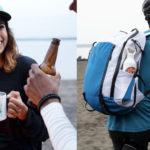Seventh Generation issues this warning:
The chemical Bisphenol-A is a hormone-disrupting chemical found in polycarbonate water bottles and food containers, food and soda can linings, toys, CDs and DVDs, eyeglasses, and dental sealants. When exposed to acidic substances in certain foods, heat, washing, the BPA may leach out into your food or liquids. It mimics estrogen, and studies show possible carcinogenic and neuro-toxic effects. It may even trigger fat cell activity, causing obesity.
They recommend the following ways to avoid this toxin:
• Avoid canned soda and acidic canned foods like tomato and citrus products.
• Look at the recycling symbols on the plastics you use in the kitchen. Don’t buy, serve, or consume foods and beverages sold or served in #7 plastics, the category that includes polycarbonate plastics that contain BPA. Better options include polypropylene (#5 PP), high-density polyethylene (#2 HDPE), and low-density polyethylene (#4 LDPE). No evidence has been found to suggest that these plastics leach toxic materials.
• Ask your dentist about the sealants he or she uses. If their sealants contain BPA or if they’re unable to verify whether or not this is so, refuse the treatment.
• Use glass baby bottles exclusively. For beverages for young children and grown-ups, replace any polycarbonate sippy cups and water bottles you have with those made from the safer plastics listed above or stainless steel.
• Don’t give hard plastic toys to infants, teething children, or any kids who still put everything in their mouth unless you can verify that they’re polycarbonate-free. Opt for safer wooden toys and teething rings, etc.
• When it comes to those polycarbonate plastics you choose to keep, wash them carefully in warm water and gentle dish liquid. Don’t subject them to hot water, harsh detergents, bleach, or microwaving, all of which can help BPA leach out.
• If you use any of these items for eating and drinking, try not to let food or beverages sit in or on them too long. The longer edibles remain in contact with the plastic, the greater the likelihood of BPA contamination.




